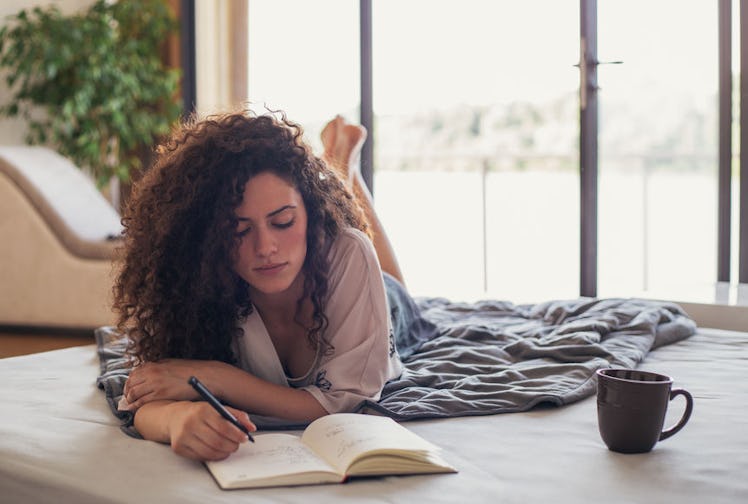
If You're Losing Sleep Over The Holidays, Here's How To Catch Up On Your Rest
I'm a sucker for a good holiday party. I love the excuse to wear the most sparkly outfit I can throw together, the chance to experiment with a fancy new cinnamon-y recipe I've been wanting to try, and of course, the opportunity to catch up with my friends and family. But as much as I'm all about celebrating this time of year, it's taken a bit of a toll on my sleep lately. I'm definitely behind on my Christmas present-shopping, and scrolling through Amazon late at night is not helping me snooze. If you're losing sleep during the holidays, too, you're definitely not alone.
Tempur-Pedic recently conducted a survey of over 1,200 people to figure out how holiday stress affects sleep, and boy can this time of year make it harder to get your eight hours. According to the results of the survey, which were sent directly to Elite Daily via email, 26 percent of respondents said they miss out on at least two hours of sleep each night during the holidays, due to things like financial pressure, crowds, and other holiday-related stressors.
If you feel like your own sleep schedule has taken a bit of a hit as a result of shopping for your loved ones or trying to make every festive party you've been invited to, it's not as hard as you think to get your bedtime back on track.
One unexpected way to keep your sleep schedule running smoothly is to keep up your regular workout routine, says Carolyn Graves, sleep expert and executive team member of sleep company Zonkd. Even if you try something as simple as a little light yoga right before bed, getting active during the day will really help prepare your body for snoozing. "As much as you may want to, don’t throw your normal [workout] routine out the window," Graves tells Elite Daily. "Not only your sleep schedule, but your exercise schedule is important to maintain to avoid sleepless nights."
Your room can definitely play a part in how relaxed you are, too, so pay attention to how cluttered things are. Make sure your bedroom is a sleep sanctuary instead of an environment that makes it difficult for you to relax, recommends Bill Fish, certified sleep science coach and founder of Tuck. "If you have piles full of gifts that need to be wrapped, place them in closet with the door closed," he suggests. "Keep your room dark and cool, and a white noise machine is never a bad idea to block out ambient sounds that could awaken you throughout the night."
If you've been tossing and turning for what seems like forever, start off by trying not to think about falling asleep. Instead, try reading a book or listening to a podcast to help your mind de-stress, and then turn your attention to your physical body, suggests Fish. "Start at your toes and flex and release each individual muscle group for five seconds," he tells Elite Daily. "As you finish each group, move further up the body. It forces your mind to both concentrate on the muscle groups as well as counting."
Honestly, you know your own body better than anyone, so take some time to touch base with yourself and identify some of the things that make you feel the calmest. “Anything that helps you relax will make your transition to sleep easier, so give some thought to what helps you wind down in the evenings," Brent Pfister, vice president of marketing at Tempur-Pedic, tells Elite Daily in an email. For example, my mom finds puzzles to be super soothing, but personally, the thought of having to fit together that many tiny pieces just makes me more anxious. Instead, I swear by drinking a glass of cold almond milk with a sprinkle of cinnamon to be just the thing to make my eyes start drooping.
Sometimes, though, holiday stress isn't easily solved by standard sleep tips. If you’re feeling significantly overwhelmed by something and it's really hurting your ability to rest, you can always try speaking to a professional for some extra guidance. One mental wellness app called Basis, for instance, can connect you with professional help through a 45-minute video or phone call.
While starting off with healthy sleep strategies is a great place to begin, nobody should be afraid to take a sleep issue as seriously as any other health issue, says Andrew Chapin, sleep expert and co-founder/CEO of Basis. "If [you] still don’t improve and holiday stressors start causing the same amount of disruption as a physical ailment would, [you] should seek professional help from [your] doctor," he tells Elite Daily.
Definitely keep your overall mental health in mind if you're having trouble sleeping at night, says Jagdish Khubchandani, PhD, sleep expert and associate professor of community health at Ball State University. "Sleep problems are often accompanied with psychiatric disorders in winter holidays (seasonal affective disorders and depression, for example)," he tells Elite Daily, so don't be afraid to reach out to someone you trust for some support if you think you might be experiencing these issues.